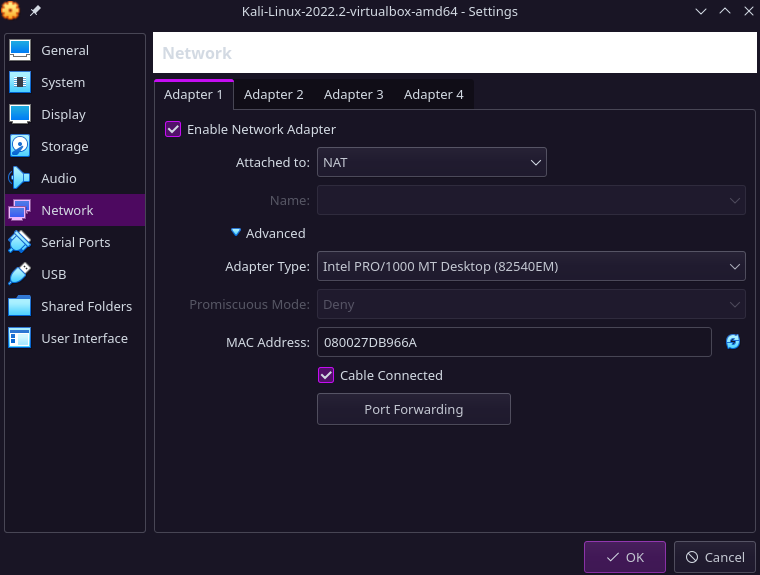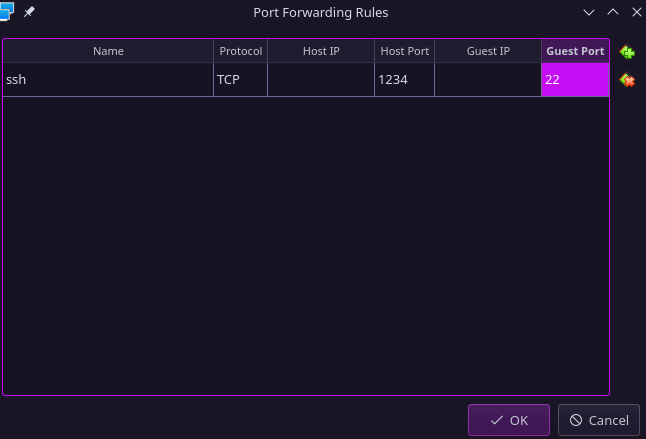How to SSH into a virtualbox virtual machine
I will be SSHing from my host computer to a kali virtual machine.
In virtualbox network settings, select attached to: NAT and then click port forwarding:

Add a new entry with guest port 22 and choose a host port:

Start the SSH service on the virtual machine if there isn’t one already:
sudo apt install openssh-server
sudo systemctl start ssh
Now you’re able to SSH into the virtual machine.
[connor@fedora ~]$ ssh -p 1234 kali@127.0.0.1
kali@127.0.0.1's password:
Linux kali 5.16.0-kali7-amd64 #1 SMP PREEMPT Debian 5.16.18-1kali1 (2022-04-01) x86_64
The programs included with the Kali GNU/Linux system are free software;
the exact distribution terms for each program are described in the
individual files in /usr/share/doc/*/copyright.
Kali GNU/Linux comes with ABSOLUTELY NO WARRANTY, to the extent
permitted by applicable law.
┌──(kali㉿kali)-[~]
└─$
Next you might want to setup passwordless login with private/public keys.
How it works is you create a private/public keypair, then copy your public key to the machine you want to login to, then use your private key to authenticate.
Creating a keypair: (~/.ssh/id_rsa is the private key, ~/.ssh/id_rsa.pub is the public key)
[connor@fedora]$ ssh-keygen
Generating public/private rsa key pair.
Enter file in which to save the key (/home/connor/.ssh/id_rsa):
Enter passphrase (empty for no passphrase):
Enter same passphrase again:
Your identification has been saved in /home/connor/.ssh/id_rsa
Your public key has been saved in /home/connor/.ssh/id_rsa.pub
The key fingerprint is:
SHA256:2wjgSWDuS8NbHPXr7LPxhFtQwab9uylv97rnlrHSD1E connor@fedora
The key's randomart image is:
+---[RSA 3072]----+
| o . .. |
| o . . . o. |
| . + .+. E|
| o + + .o. . |
| = = . S . . |
| . = + * . o |
| o B + .o +|
| ..*. oo.=o|
| +o.++o+B=|
+----[SHA256]-----+
Copying the public key to the virtual machine: (it will append it to the file ~/.ssh/authorized_keys)
[connor@fedora]$ ssh-copy-id -p 1234 kali@127.0.0.1
/usr/bin/ssh-copy-id: INFO: Source of key(s) to be installed: "/home/connor/.ssh/id_rsa.pub"
/usr/bin/ssh-copy-id: INFO: attempting to log in with the new key(s), to filter out any that are already installed
/usr/bin/ssh-copy-id: INFO: 1 key(s) remain to be installed -- if you are prompted now it is to install the new keys
kali@127.0.0.1's password:
Number of key(s) added: 1
Now you can login securely without having to enter your password.
Note: if you want to use another key not in the default directory (~/.ssh), you can specify it with -i:
ssh-copy-id -i key -p 1234 kali@127.0.0.1
ssh -i key -p 1234 kali@127.0.0.1